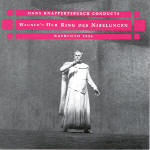Three complete Hans Knappertsbusch Ring Cycles recorded live at the Bayreuth Festival exist via archival or broadcast tapes recorded at the performances. The 1957 and 1958 cycles have circulated on Cetra and Melodram LPs and CDs. By contrast, most of the 1956 cycle appeared for the first time when issued by Melodram and Music & Arts in 1997. Music & Arts has brought out this cycle in its midprice “Merit” series, with identical packaging and presentation.
Chiefly renowned for his Wagner interpretations, Knappertsbusch disliked recording as much as he abhorred rehearsals. He preferred to “wing it” in the theater, allowing the inspiration of the moment to guide the performance at hand, letting the chips fall where they might. Consequently, you never knew what you were going to get for the price of your ticket. For instance, there are wonderful moments aplenty throughout the 1957/58 Rings. But the stodgy, pedestrian, and often sloppy work that generally persists does not hold up under the microphone’s unforgiving scrutiny. Not that Knappertsbusch would have wanted these Rings issued, but that’s neither here nor there.
On the other hand, just about every bar of his 1956 Ring reveals that Kna could deliver first rate, even inspired goods when he put his mind to it. Even considering the tortoise-like pacing and massive textures, Knappertsbusch’s shaping of each opera boasts more pointed detail, greater animation within phrases, and sharper dramatic contours. His singers, in turn, respond with more vivid performances than their norm under this conductor. Perhaps the principals (Varnay, Neidlinger, Windgassen, Hotter, and Greindl) are in fresher vocal estate three years earlier for Clemens Krauss and Joseph Keilberth, yet their moment-to-moment involvement plus unusual care in making the words clear is never in question.
Both Siegfrieds were still relatively new roles for Wolfgang Windgassen, and his interpretation had evolved quite a bit in three years, especially in the opera named for the protagonist. The hero’s Act Two musings take on a new introspection, and there’s more intensity now to his crucial encounter with the Wanderer in Act Three. Die Walküre lets us hear Windgassen’s Bayreuth Siegmund for the first time; the tenor was an eleventh-hour replacement, and an effective one at that. Gré Brouwenstijn partners him as Sieglinde, and the soprano radiates more spontaneity here than in her underrated studio portrayal under Leinsdorf. In Götterdämerung Brouwenstijn’s inward and musicianly Gutrune breathes new life into a role that is often slighted. Hans Hotter brings immense authority to both the Rheingold and Walküre Wotans and the Wanderer in Siegfried, and is in fresher voice than for his contributions to the renowned Solti studio Ring. Astrid Varnay’s powerful Götterdämmerung Brunnhilde, by contrast, is a shade less steady than the 1951 Bayreuth performance under Knappertsbusch issued on Testament.
The booklet notes contain a valuable essay by Wagner specialist William Youngren, who dissects the performances point by point, underlining Knappertsbusch’s virtues and defects with rare perception and fairness. He rightly takes issue with Kna’s (not Wagner’s) abrupt and awkward ritards, yet praises the conductor’s cohesive yet unhurried traversal of Das Rheingold. Music & Arts reproduces these archival Bayreuth tapes at a higher decibel level than the Melodram edition, and with better side breaks, but you hear more tape hiss. The last notes of Götterdämmerung Act Two dovetail without warning into the Act Three Prelude. This happens on the Melodram set as well. Strange. All in all, this Ring makes as persuasive a case for Knappertsbusch’s Wagnerian prowess as the 1950 Bavarian Opera Tristan und Isolde and 1962 Bayreuth Parsifal.
































